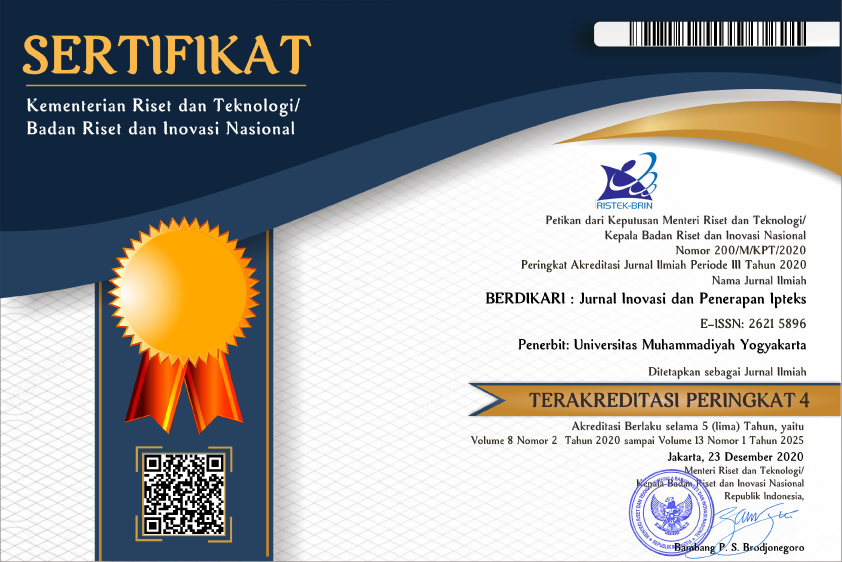Penguatan Teknologi Olah Buah Salak dalam Upaya Peningkatan Kualitas Produk
DOI:
https://doi.org/10.18196/bdr.8284Keywords:
skills, chips, salak fruit processing, packaging, vacuum fryingAbstract
Salak pondoh is a typical fruit of Sleman Regency which has been known domestically and abroad. Salak pondoh fruit has been generally marketed in fresh and processed form. The Agawe Santosa Community Association (MAS) located in Turi District, Sleman is one of the Micro, Small and Medium Enterprises (MSMEs) that produces various processed salak fruit. The availability of the fresh fruit as raw material for processing salak fruit has fluctuated due to the season, so the volume of processed salak fruit products also becomes unstable. This condition gets even worse because of the fruit processing technology which is still conventional. Efforts to maintain volume stability of salak fruit processed products need to be done so that fluctuations in producer income can be reduced. Community empowerment program or UMKM through strengthening the technology of salak fruit is a solution to maintain this stability. The empowerment of salak fruit processing technology is through the application of Vacuum Frying Technology (low pressure vacuum frying). This technology is able to guarantee that salak fruit processed products can be stored for a relatively long time. The application of Vacuum Frying technology is carried out in several stages, which are introduction, education (training and technology transfer practices), mentoring, and post-practice monitoring of technology application so that sustainability is guaranteed. Empowerment of UMKM Paguyuban MAS is said to be successful with indicators of increasing knowledge and skills in using Vacuum Frying (especially chips products) by 58.4%, packaging processed salak fruit products (chips) and production management by 60%, as well as guaranteeing business sustainability.
References
Bremeer, Rachel., Syane Palijama, dan Febry R. Palijama. 2018. Pengaruh Pengaturan Suhu Penggorengan Vacum Terhadap Sifat-Sifat Kimia Keripik Salak (Salaca edulis Reinw). AGRITEKNO, Jurnal Teknologi Pertanian. Vol. 7(2):56-59. ISSN 2620-9721.
Dueik V, Robert P, and Bouchon P. 2010. Vacuum frying Reduce Oil Uptake and Improves The Quality Parameters of Carrot Crisps. Food Chemistry 119: 1143-1149.
Garayo J. and R. Moreira 2002. Vacuum frying of Potato Chips. Journal of Food Engineering 55: 181-191
Iswari, N.M.C. 2013. Optimasi suhu dan waktu penggorengan hampa (vacuum frying) dalam produksi keripik ubi jalar Mentawai. [Skripsi] Departemen Teknik Mesin dan Biosistem, Fakultas Teknologi Pertanian, Institut Pertanian Bogor. Bogor.
Mariscal M, and Bouchon P. 2007. Comparison between Atmospheric and Vacuum frying of Apple Slices. Journal Food Chemistry 107: 1561-1569
Nugraha, S., Sugiyanto, N.F. Sulvana, R. Tito, dan K. Titis. 2012. Elastisitas dan Permintaan Hasil Pertanian. Makalah Tataniaga Pertanian, Universitas Sebelas Maret. Surakata.
Tumbel, Nicolas dan Supardi Manurung. 2017. Pengaruh Suhu Dan Waktu Penggorengan Terhadap Mutu Keripik Nanas Menggunakan Penggoreng Vakum. Jurnal Penelitian Teknologi Industri Vol. 9 No. 1 Juni 2017 : 9-22. ISSN No.2085-580X.
Wijayanti R. 2011. Kajian Rekayasa Proses Penggorengan Hampa dan Kalayakan Usaha Produksi Keripik Pisang [tesis]. Bogor: Sekolah Pascasarjana, Institut Pertanian Bogor.
Wijayanti, R., I.W. Budiastra, dan R. Hasbullah. 2011. Kajian rekayasa proses penggorengan hampa dan kelayakan usaha produksi keripik pisang. Jurnal Keteknikan Pertanian 25: 133-140
Downloads
Published
Issue
Section
License
Copyright
Authors retain copyright and grant BERDIKARI Jurnal Inovasi dan Penerapan IPTEK the right of first publication with the work simultaneously licensed under an Attribution 4.0 International (CC BY 4.0) that allows others to remix, adapt and build upon the work with an acknowledgment of the work's authorship and of the initial publication in BERDIKARI Jurnal Inovasi dan Penerapan IPTEK.
Authors are permitted to copy and redistribute the journal's published version of the work (e.g., post it to an institutional repository or publish it in a book), with an acknowledgment of its initial publication in BERDIKARI Jurnal Inovasi dan Penerapan IPTEK
License
Articles published in the BERDIKARI Jurnal Inovasi dan Penerapan IPTEK) are licensed under an Attribution 4.0 International (CC BY 4.0) license. You are free to:
- Share — copy and redistribute the material in any medium or format.
- Adapt — remix, transform, and build upon the material for any purpose, even commercially.
This license is acceptable for Free Cultural Works. The licensor cannot revoke these freedoms as long as you follow the license terms. Under the following terms:
- Attribution — You must give appropriate credit, provide a link to the license, and indicate if changes were made. You may do so in any reasonable manner, but not in any way that suggests the licensor endorses you or your use.
- No additional restrictions — You may not apply legal terms or technological measures that legally restrict others from doing anything the license permits.




